Philippines Supreme Court hears legal challenge seeking equal marriage
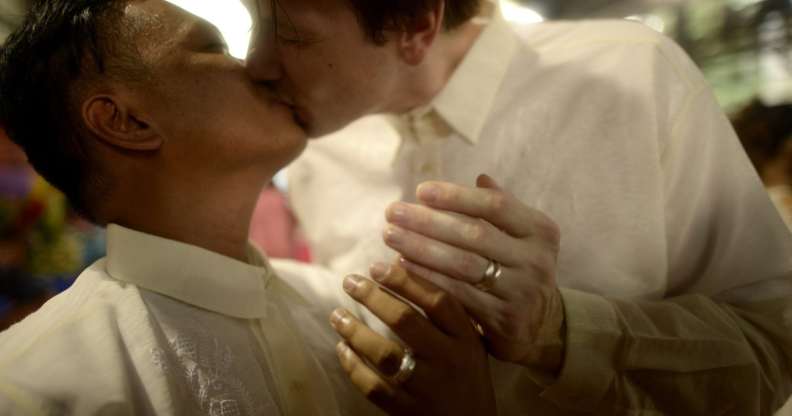
Two men kiss during a Rite of Holy Union ceremony for the Lesbians Gays Bisexual and Transgenders (LGBT) community in Manila on June 28, 2015. (NOEL CELIS/AFP/Getty)
The Philippines Supreme Court has begun to hear a legal challenge seeking same-sex marriage.
The court has today (June 19) begun to hear the challenge from gay activist and lawyer Jesus Falcis, 31, who is seeking to challenge the Family Code of the Philippines, a law that defines marriage as “a special contract of permanent union between a man and a woman.”
Falcis will argue that the law violates his constitutional rights to life and liberty, and argue that limiting civil marriages to opposite-sex couples violates the equal protection clause of the Philippines Constitution.
The move is opposed by religious leaders in the strongly Catholic country, but Falcis contends that his right to a civil marriage is nothing to do with religion.
Speaking to The Guardian, he said: “I want to emphasise, we are talking about civil or legal marriage. Churches all over the country will still be able to perform their own religious marriages according to their own doctrines.”
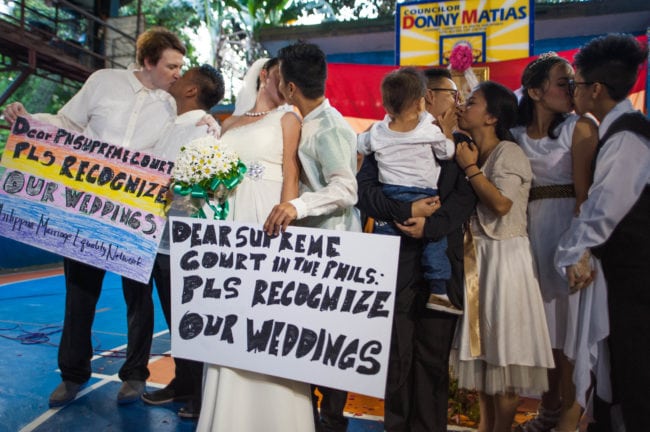
Filipino LGBT couples hold placards and kiss their partners during a mass ‘wedding rites’ on June 28, 2015 in Manila, Philippines. (Dondi Tawatao/Getty)
In his opening arguments, Falis cited the case of gay couple Cresencio Agbayani and Marlon Felipe, who have been together for 12 years but are still treated as “strangers” by the law, which does not recognise any form of partnership for same-sex couples.
According to the Philippine Star, he said: “They are growing old… they worry about a lot of things married couples don’t worry about – does my partner have a right to my government benefits? Will my partner be allowed in the hospital to make decisions for me? Does my partner have the legal right – and duty – to make funeral arrangements for me?
“[The ban] denies the petitioners of the equal protection of the laws, and violates the religious freedom of petitioners.”
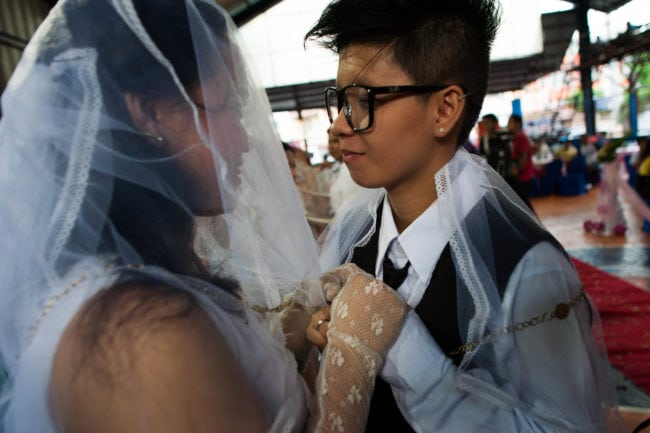
A Filipino couple exchange ‘Rite of Holy Union’ vows during mass ‘wedding rites’ on June 28, 2015 in Manila, Philippines. (Dondi Tawatao/Getty)
The Office of the Solicitor General will attempt to defend the law as it stands, arguing that Falcis has no standing to challenge the law and that he has failed to show any “injury” as the result of the current provisions banning gay marriage.
The country’s unpredictable and volatile President Rodrigo Duterte, who is often likened to Donald Trump, has repeatedly flip-flopped on whether he supports gay unions.
During the run-up to the 2016 presidential election Duterte said he would push for legislation to allow same-sex marriage, joking that the Bible should have clarified that marriage was for “Adam, Eve and the gays.”
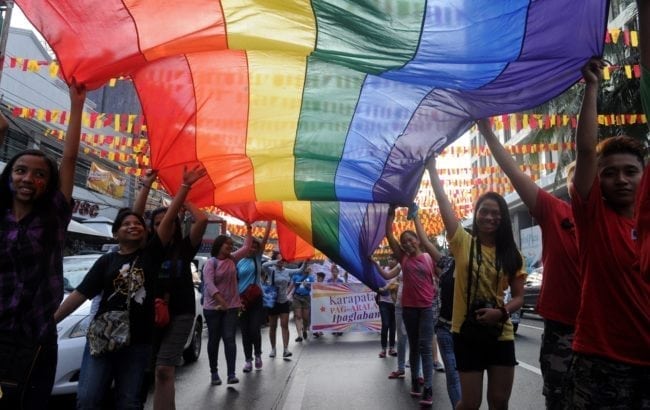
Members and supporters of the lesbian, gay, bisexual, transgender (LGBT) community take part in a parade in Manila on December 13, 2014. (JAY DIRECTO/AFP/Getty)
In March 2017 he abruptly reversed his stance, insisting LGBT issues were Western culture and “can’t apply to us, because we are Catholics.”
He added: “And there is the civil code, which states you can only marry a woman for me, and for a woman to marry a man. That’s the law in the Philippines.”
Duterte completed his full 360-degree turn in December 2017, when he again offered support for same-sex marriage and has said he plans to set up a LGBT commission.
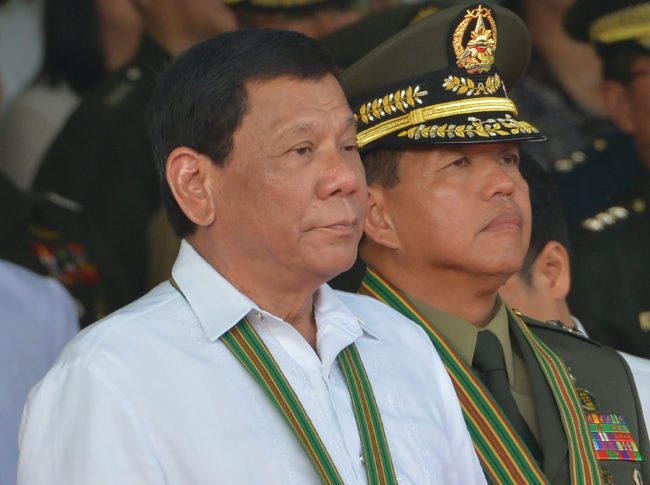
Philippine President Rodrigo Duterte (TED ALJIBE/AFP/Getty Images)
The President said he “doesn’t have a problem with a man marrying a man,” adding: “We will have to change the law.”
A statement from his office said: “President Duterte is the president of all Filipinos. This administration has long espoused inclusivity and sensitivity. We make no distinction. We are all Filipinos enjoying our rights, freedom and equality before the law.”
The Philippines is one of the most LGBT-friendly countries in Asia, with a 2014 poll finding that 73 percent of Filipinos believe homosexuality should be accepted.
However, there has been little in the way of progress.
There are no national LGBT anti-discrimination laws, no recognition of same-sex marriage, and the Family Code of the Philippines defines marriage as “a special contract of permanent union between a man and a woman.”

